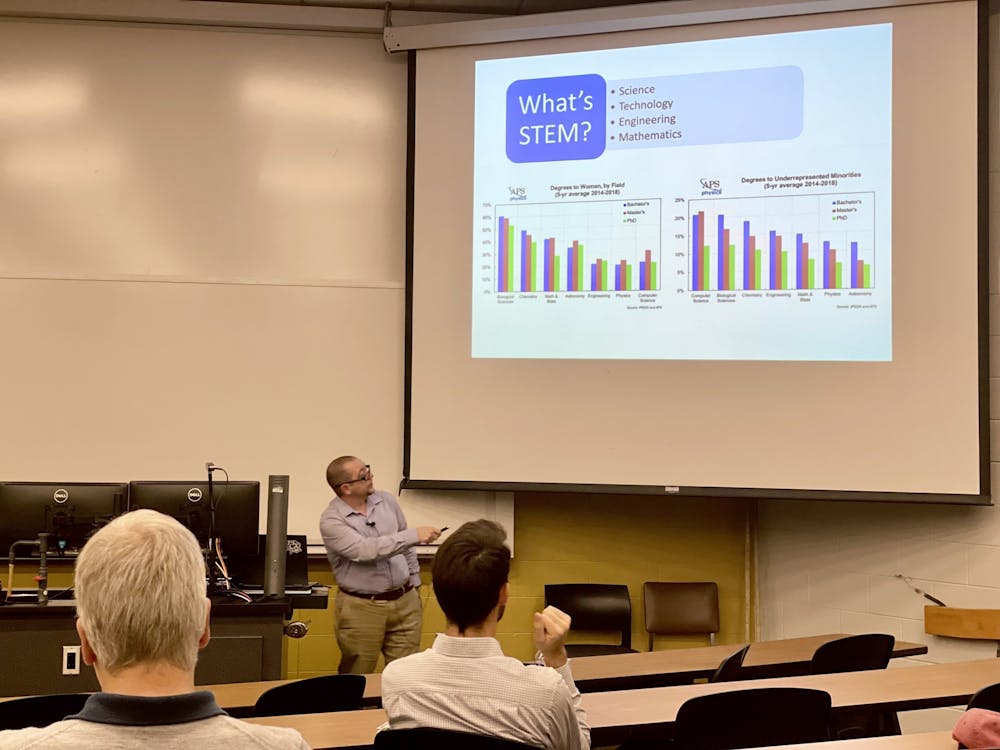'Diversity is the consequence of inclusion'

On Sept. 22 at the Dow Science Complex in room 102, Michael Kilburn, physics professor at Muskegon Community College, spoke on 'Why STEM Lacks Diversity.'
According to the Muskegon Community College website, Kilburn trained as a nuclear physicist and has been teaching physics and science literacy for 10 years. He earned his Bachelors from Northern Michigan University and received his Ph.D. in physics from Michigan State University.
In 2011, Kilburn went to University of Notre Dame to participate in the Outreach Activities program that focuses on networking with the public to gain more contributors to physics. He said he began his informal research 11 years ago, when he was with the OAP, on issues that were apparent in the physics department; diversity.
'Why STEM still lacks diversity'
"Recruiting too late."
Kilburn said that recruiting typically starts in high school when most students are already decided for/or against STEM at that point.
"If we are recruiting at the high school level, we are just stealing from other STEM fields ... we are not increasing diversity in STEM if we are all just stealing from each other."
"We ignore differences in gender and perception"
Kilburn explained that western society views women as hardworking instead of brilliant; meaning that STEM fields are "undervaluing women and losing talent."
"People, especially scientists, categorize things for quick assessment. When you do it with people, that's how we get stereotypes ... when we apply them to individuals we definitely run the risk of misjudging them."
"We think we evaluate people based on merit"
Kilburn said that physicists see themselves as "smart and objective," therefore they evaluate people because "that's just being objective."
"If we have a rigorous selection system that's selecting for one type of person that we think is a good physicist, are we ever going to have diversity of thought?"
"We treat diversity as the goal"
Kilburn discussed how people from different cultures carry different experiences to add to the conversation -- "this diversity of thought is the source of innovative gain."
"It's because we treat diversity as the goal. Administration says we want more diversity ... so we treat that as the goal. If instead we treated inclusion as the goal; I think diversity is a natural consequence of inclusion. If we are inclusive, we'll have diversity."
When a student asked a question regarding how diversity can be implemented on campus Kilburn responded saying that policies are too often adopted by people saying, "Heres what we are supposed to do, let's fix it."
"If you are just doing it to fix it, that's not the point," he said. "You actually have to believe that this is something that you should do to make yourself feel better."
Kilburn's Research
In his seminar, Kilburn had mentioned that although there is a lack of diversity regarding race in the STEM field, he didn't have enough statistical data to speak on behalf of that issue. His research mainly discussed the lack of women in physics.
According to Kilburn's informal research, about 20% of women in 2018 in STEM earned a Bachelor's degree in physics, while 65% of women received a Bachelors in earth science. Furthermore, in 2011 Kilburn hosted a 'Physics of Atomic Nuclei' bootcamp at MSU for high school students interested in physics; 25% of applicants were female.
Kilburn utilized research conducted by Philip M. Sadler and his colleagues that analyzed STEM interest in high school students in 2012. The research found that 75% of graduating seniors interested in engineering/science, excluding medicine/health, were male.
In addition, Kilburn conducted an experiment that highlighted how professors are more likely to describe male students as genius and female students as hard-working. When the roles are reversed, students will refer to male professors as their 'funny professor' whereas female professors are more likely to be referred to as their 'caring teacher.'







